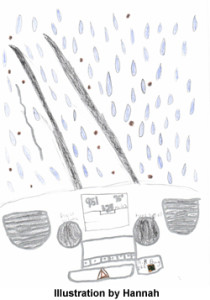 Have you been driving on the highway and all of a sudden a heavy rain started pounding on your windshield? You start the wipers, but the rain is so hard that your view become distorted. I well remember times when I’ve been caught in a heavy rain out on the interstate, and my windshield suddenly began to look just like the one Hannah has drawn. I knew I had better make a fast exit or run the risk of an accident.
Have you been driving on the highway and all of a sudden a heavy rain started pounding on your windshield? You start the wipers, but the rain is so hard that your view become distorted. I well remember times when I’ve been caught in a heavy rain out on the interstate, and my windshield suddenly began to look just like the one Hannah has drawn. I knew I had better make a fast exit or run the risk of an accident.
This is the dilemma we face as we try to cope with circumstances we encounter each day. Because we see only part of the picture we call life, our view of life’s circumstances can become distorted based on our perception of what is happening. Sometimes we get it right, sometimes we don’t.
Perception is defined as: The mental grasp of objects through the senses, insight, how we view things.
Sadly, children face this same dilemma. A child’s perception during or after a loss can be very distorted, mainly because they are viewing and analyzing things with childlike wisdom, childlike knowledge, and childlike understanding. Therefore, the real truth of a loss may be erroneous.
To name just a couple of examples of wrong perceptions children might have:
1. My Fault Syndrome
Probably #1 on the list of distorted perceptions is when a child believes losses are his fault. Children often believe that if they had been a better kid, their parents would not have divorced. Some even perceive death as their fault by thinking, “if I had only prayed more, my loved one would not have died.”
2. Interpretation of Marital Problems of Parents
Kids who see Mom and Dad fighting may assume they know the reason for the fight when, in essence, it could be their interpretation of the problem. The real reasons a couple is having problems are bigger than kids can understand. They cannot see into the world of grown-ups and all that it involves.
3. Parents Who Never Allow Children to Know About Their Disagreements
Let’s face it — there are no Norman Rockwell Families. Most families are going to have disagreements at some point in time. However, some parents never allow their children to witness any form of disagreement between them. These children grow up perceiving that marriage and family relations are perfect, only to discover the hard way that there are, indeed, times of conflict. Because of the “so-called perfect environment,” the adult child now has no coping skills to handle conflicts.
I personally perceived several losses in my childhood erroneously. It wasn’t until years later when I began to grow in wisdom that I was able to see that I had perceived some things based on my distorted view as a child. I had viewed certain circumstances with childlike wisdom, childlike knowledge, and childlike understanding. As a result, I needed healing in my adult life from losses in my childhood that I had actually viewed wrong.
So, how can we help a child keep his vision clear? After all, a loss of any kind is going to hurt, but having perceived it wrong, only brings about added hurt.
The truth of the matter is that “Wrong Perceptions” cannot always be detected in children. However, as caring adults, we must make a conscientious effort to be on the look-out for questions the child might have and answer them honestly. Also, be available to listen for what he is saying or not saying.
In short, be there for him and help him grow into adulthood free of distorted truths surrounding his loss.
Join Hannah and me right here next week as we take a look at Building Self-Esteem in children.










Beautifully written! I look forward to reading all of your posts…and of course, I’m so proud of Hannah’s illustrations.
Thanks, Samantha for following Hannah and me. And also thank you for teaching her art and encouraging her in it. I usually just give her an idea of what I am writing on, and leave it to her. That is what all of you artistic creative people can do; I am not one of them.
I have read that children learn to resolve issues from seeing their parents experiencing issues. If you don’t see them argue and resolve things, you have no tools to handle your own.
You are so right, Virginia. Children model what they see their parents do in most all situations. Thanks for reading and commenting.